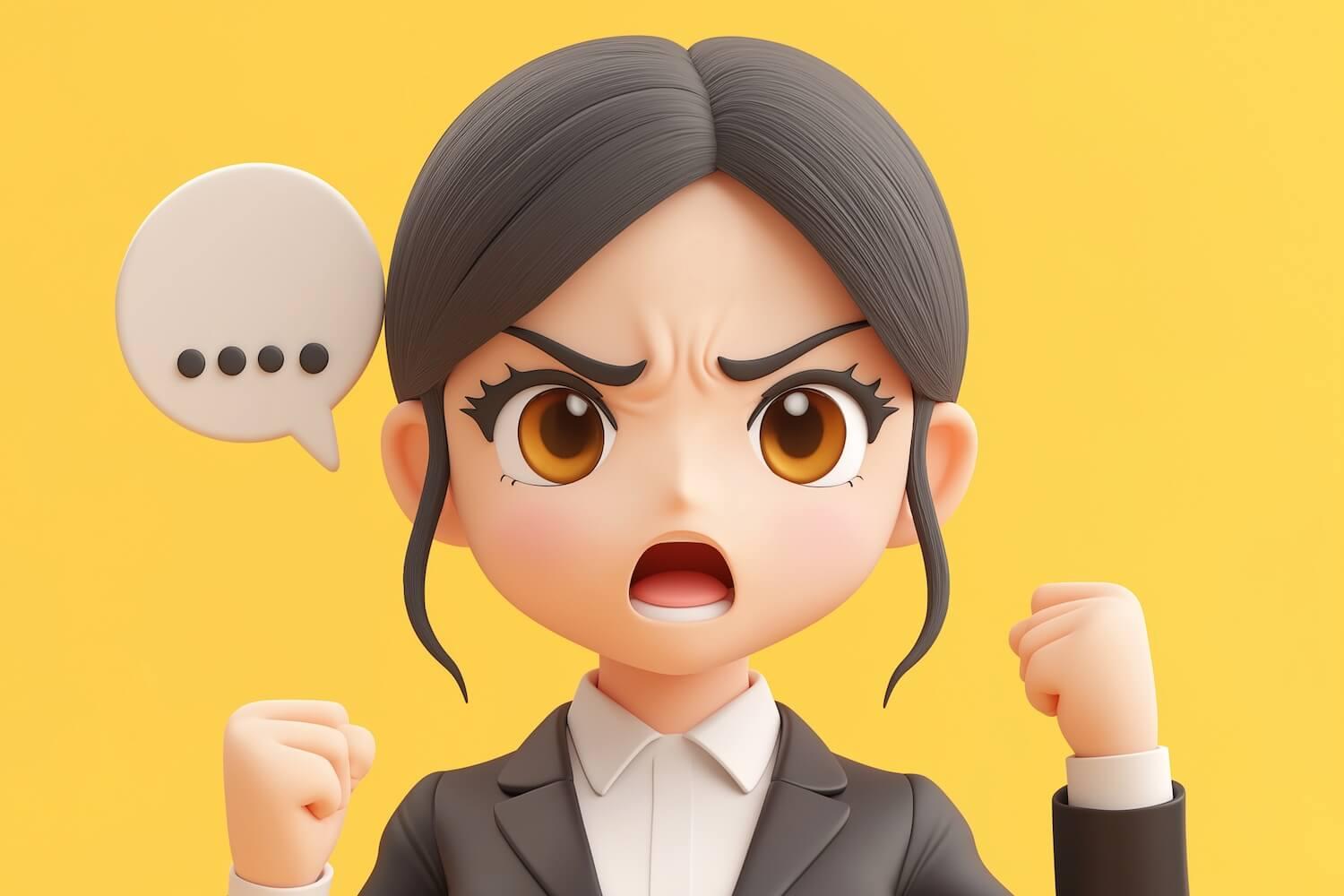Table of Contents
Intro
When learning a foreign language, one way or another, you will come across swear words and Japanese is no exception. It is important to be aware of those swear words NOT because it is good to use them but it can deepen your understanding towards the culture and the society even more.
Today, we are going to learn 15 Japanese swear words with their contexts, example sentences (with YouTube video clips), who uses them and how strong of a word they are. Please be cautious if you end up using them!
For example sentences, HayaiLearn can easily let you find various cases of examples. Go to the "Words" on the side bar, search a word, click to see its dictionary and it will show you dozens of useful and practical examples with the links to specific clips from YouTube.
I have categorized these 15 words into 3 levels of intensity: mild, medium, and strong, so that we can picture the sensitivity of each word when used in Japanese society. Later in the article, I have included a chart showing up to what age Japanese people use these words as well (as a disclaimer, the chart is not based on an actual study but it is rather based on a Japanese native speaker’s point of view who grew up in Japan over 20 years).
Mild Swear Words
1. ばか(Baka)- Stupid
ばか is probably the most commonly used swear word and because it can be on a milder side of the intensity spectrum, some may use it while teasing others as well. And as you can see in the chart below, this word is widely used by people up to 100 years old in Japan.
2. あほ(Aho)- Stupid
あほ is perhaps less popular than ばか but also means stupid. The difference between the two is that あほ tends to be used more in the west of Japan, while ばか is used more in the east. It is also widely used across all age groups.
3. ちくしょう(Chikusho) - Damn it!
This one isn’t a swear word meant to be directed at someone but rather used when facing a frustrating situation. As it is not used towards others, it is also on the milder side. ちくしょう is widely used, but we don't often hear people in their 90s and older using it.
4. デブ(Debu)- Fat
Japan cares a lot about body shape and especially cares about how others see their body. Thus, calling someone fat can become very insulting. This word is also widely used across different generations.
5. ちび(Chibi)- Midget
Similar to デブ, Japanese people tend to have insulting words toward to body shape. ちび is also used with different demographics.
6. ハゲ(Hage)- Bald
Being bald is one of the concerns among adult Japanese men. However, in reality, this word gets used a lot towards people either not bald or having a buzzcut. Ironically, Japanese people rarely call actual bald people bald. This word is popular among youths (between 10s and 20s).
Medium Swear Words
7. うるせえ(Urusee)- Shut up
This can be used when someone is being annoying or if there is loud noise/music. The original form of うるせえ is うるさい, which means loud. This is widely used among different generations in Japan.
8. くそ(Kuso)- Shit/F-word
くそ literally translates as poo and can be used in the same situations as shit or fuck in English. It can also be used as an adjective to intensify your comment. For example, “very smart” would be くそ頭いい and “fucking hot” would be くそ暑い. This word is most popular among youths.
9. ブス(Busu)- Ugly
When you call someone ugly, this is most likely the go to word to use. In some other articles on the internet, it is explained as this word is only towards women, while it gets used towards women more often, however, it can also be used against men as well. Very widely used as well across different age groups.
10. うざい(Uzai)- Annoying
This would be the exact equivalent and translation of annoying. Short words like ばか, ゴミ, and ブス tend to be popular among youths in Japan due to their brevity and versatility. Teenagers especially frequently use うざい.
11. ゴミ(Gomi)- Trash
ゴミ is an exact translation of trash and can be used in the same situations. While trash describes the quality of someone or something, ゴミ is mostly used towards someone.
Strong Swear Word
12. ふざけるな/ふざけんな (Fuzakeruna/Fuzakena) - F*ck off!
Original form of ふざけるな/ふざけんな is ふざける which means fool or mess around. な is a character that negates the word that comes before it do if we try to literally translate ふざけるな/ふざけんな, it would mean “stop messing around.” This is used mostly when you are throwing anger at someone that caused you a serious trouble.
13. クズ(Kuzu)- Piece of shit
This can be used towards others as well as oneself and is quite offensive. クズ can be translated as scum, implying the insignificance of the person. Older generations tend to avoid using it due to its intensity.
14. しね(Shine)- Die / Go to hell
This is one of the most infamous swear words, especially among elementary to middle school students in Japan. It is quite harsh, as you are literally telling others to die or go to hell. It is often used by bullies in school and can be very harmful. As people get older, they realize the gravity of the word and gradually stop using it out of respect for others.
15. ヤリマン(Yariman)- Slut
Among the 15 words explained today, this is by far the strongest in terms of how offensive it can be, especially towards women. Sadly, this word is often used by teenagers to create rumors. As people mature, they gradually stop using this word due to its vulgarity.
Swear words Intensity and Age Chart

FAQ on Japanese Swear Words
1. What is the F word in Japanese?
F word in Japanese is くそ (Kuso) and it translates as “poo (literal translation)”, shit or fuck. くそ can be translated as the F word when you become angry towards something. For example, when you lose in a sport same, you might say くそ (f*ck).
2. Which swear words can be used between friends for more like teasing?
Naturally speaking, the harsher the word becomes, the more you want to avoid using them. So in this case, ばか or あほ are the ones you can use between friends and can still be used as teasing each other.
3. Why depending on the generations, certain swear words are used more/less in Japan?
In Japan, younger people tend to be more active users of swear words. Generally speaking, as people get older, they become more conservative with their language. Another tendency that we can point based on the chart we have above in this article is that youths tend to use shorter words like ハゲ、ゴミ、しね as shorter words are their preference.
4. Is it true that Japanese doesn't have swear words?
In English, certain swear or curse words, such as the F-word or "damn," are considered taboo. These words are often censored on TV and hidden from children. However, the Japanese language doesn't have this same cultural context. The words we have introduced in this article are not censored on TV or kept secret from children.
Culturally, Japanese doesn't have the belief that "using specific words can bring bad luck or curse the speaker." So in this sense, we can say Japanese doesn’t have swear/curse words. Although we can still translate f*ck! into くそ!and Japanese people would understand what f*ck meant, くそ is just considered more like a word that help people merely express their feelings and doesn’t necessarily carry the taboo context.
